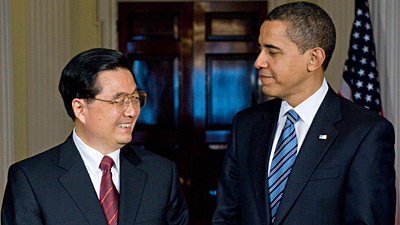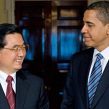
Beijing’s Diplomatic Offensive: “Marathon Autumn Diplomacy”
Publication: China Brief Volume: 9 Issue: 21

After the extravaganza marking the 60th anniversary of the People’s Republic of China (PRC), the Chinese Communist Party (CCP) leadership has unleashed what the domestic media heralds as “marathon autumn diplomacy” (malasong qiuji waijiao). Premier Wen Jiabao visited North Korea and Vice-President Xi Jinping is winding up a five-nation tour of Europe. In anticipation of President Barack Obama’s first official visit to China next month, CCP Politburo member Li Yuanchao and Central Military Commission (CMC) Vice-Chairman Xu Caihou are calling on the United States. From early October onward, dignitaries including the Japanese Prime Minister Yukio Hatoyama, South Korean President Lee Myung-bak, Russian Prime Minister Vladimir Putin and Vietnam Premier Nguyen Tan Dung paid high-profile visits to the Middle Kingdom (Xinhua News Agency, October 16; China News Service, October 9). While these summits and conferences serve a plethora of objectives, two related leitmotifs merit particular scrutiny. Given that China is assured of an eight percent growth rate this year—the best economic performance of any major country worldwide—the Hu Jintao Administration is eager to play up the country’s status as a “quasi-superpower” that is also a responsible stakeholder in the world community. Moreover, in the run-up to the Obama-Hu summit, Beijing wants to boost its bargaining chips with the United States by insisting on full equality in what it sees as a developing G-2. It is therefore hardly surprising that another thrust of Beijing’s Autumn Diplomacy is to undercut the weakened superpower’s global clout.
Immediately after the military parade on Tiananmen Square, Premier Wen flew to Pyongyang in an effort to persuade the Stalinist regime to return to the Six-Party Talks on denuclearization hosted by Beijing. While Dear Leader Kim reiterated the DPRK’s theoretical commitment to a nuclear-free Korean Peninsula, the dictator only expressed his country’s “readiness to hold multilateral talks depending on the outcome of the DPRK-U.S. talks.” Prior to Wen’s arrival in North Korea, the Chinese Foreign Ministry broke with past practice by disclosing that Chinese food and fuel aid to North Korea would be on the agenda. While the premier failed to nudge Kim into making concessions that would satisfy the United States, Japan or South Korea, the Chinese leadership apparently succeeded in enhancing Beijing’s ability to play the “North Korea card” vis-à-vis these three countries. New agreements on enhancing trade with the DPRK, that hit a record $2.79 billion last year, were signed (AFP, October 4; Reuters, October 5). Beijing’s decision to prop up the Kim regime was tantamount to withdrawing from participation in United Nations-authorized sanctions against the rogue regime. The CCP leadership’s message to the United States seems to be: Washington has to work more closely with Beijing if it wants to put pressure on Kim to halt its weapons program or to return to the negotiation table.
If some in the global community are disappointed by Wen’s expedition, Beijing appears convinced that its role in hosting two seminal events this month—the trilateral heads-of-government meeting among China, Japan and South Korea as well as the conclave of the premiers of the Shanghai Cooperation Organization (SCO) nations—would buttress its credentials as a promoter of global friendship and stability. The get-together of representatives of the three East Asian giants attracted more attention than usual owing to new Japanese Prime Minister Yukio Hatoyama’s advocacy of the creation of an East Asian Community (EAC). Yet partly because the EAC would incorporate “pro-U.S.” countries including India, Australia and New Zealand, the CCP administration’s feedback has been lukewarm. According to Tsinghua University Japan scholar Liu Jiangyong, the EAC may be more viable as an economic rather than a security-related concept. Professor Liu criticized Tokyo for “putting too much stress on developing the functions of the U.S.-Japan alliance, and that [Japan] has [excessively] emphasized Western values” (Liberation Daily [Shanghai], October 14; Global Times [Beijing], September 23).
The Hu-Wen team seems more interested in forging some form of strategic partnership with Japan for persuading Tokyo to refrain from applying the U.S.-Japan defense pact to Chinese territories. After all, Beijing has always been nervous about Tokyo’s alleged role as a key agent of Washington’s “anti-China containment policy.” It is perhaps for this reason that during his tête-à-tête with Hatoyama, Wen raised the possibility of moving bilateral ties one step forward by “ceaselessly injecting strategic input” into the relationship (China News Service, October 10; Xinhua News Agency, October 9). On the eve of his Democratic Party of Japan’s landslide victory in the August 30 Japanese General Elections, Hatoyama departed from tradition by underscoring the imperative of striking a balance between Tokyo’s relations with the United States and China.
The Eighth Meeting of the SCO premiers in Beijing made considerably more headway in terms of synergy and commonality of purpose. The heads of government from China, Russia, Kazakhstan, Tajikistan, Uzbekistan and Kyrgyzstan agreed to tighten financial and trade cooperation to better combat the global financial crisis. For example, a special SCO fund is being established to resolve financial shortfalls coming out of joint projects among member nations. Cash-rich Beijing has put up $10 billion to help SCO nations that run into economic difficulties (Xinhua News Agency, October 14; China News Service, October 14). Apart from collaborative efforts to combat terrorism, the SCO premiers did not dwell much on political issues. Yet it is not for nothing that the SCO has—since its inception in 2001—been characterized as a counter-balance to NATO. The fact that premiers from observer countries including Pakistan, Afghanistan and Iran took part in the Beijing deliberations added an obvious geopolitical dimension to the conclave. While Beijing has steered clear of overt criticisms of American policies toward Afghanistan, Pakistan and Iran, one message of the SCO conclave seemed to be that, particularly if Washington were forced to beat a retreat from Afghanistan and neighboring trouble spots, Beijing and SCO members might be well-placed to fill the vacuum. That Beijing is primed for a more active role at least in policy debates surrounding the Afghan imbroglio is evidenced by a China Daily article written by a senior expert at the official China Council for National Security Policy Studies, Li Qinggong. Li called upon Washington to “first put an end to the war” and then to “promote reconciliation among the Afghan government, the Taliban and the country’s major warlords” (Apple Daily [Hong Kong], October 20; China Daily, September 28).
Equally significant were bilateral talks between Prime Minister Putin and Chinese leaders. The erstwhile Communist allies signed a pact on mutual notification of plans for launching ballistic missiles. Li Daguang, a military expert at China’s National Defense University said this testified to the “special relationship” between the two countries, which already enjoy an “all-weather strategic partnership.” The two sides signed trade deals worth $4 billion. Moreover, Moscow agreed to sell China 70 billion cubic meters of natural gas per year (Reuters, October 13; People’s Daily, October 17). Equally important is the fact that at least parts of these transactions will be settled in renminbi (RMB) and roubles. This has fed speculation that Beijing and Moscow have joined hands in undermining the “hegemony” of the American dollar. China, of course, had signed similar agreements earlier in the year with another of the BRIC countries, Brazil. Moreover, China and Russia are among several countries that are conducting unpublicized talks with Middle East nations on possibly ending the practice of pricing oil in U.S. dollars. Instead, oil-and-gas transactions could, in the future, be settled with a basket of currencies that includes the Euro, the RMB and the yen (The Independent [London], October 6; Ming Pao [Hong Kong], October 14).
The jockeying for position between China and the United States was also evident in Vice-President Xi’s trip to Europe—particularly his first-ever visits to Hungary, Bulgaria and Romania. On the surface, economics and finance were the sole purpose of the tour. For example, Xi told a group of Hungarian politicians and businessmen that China would “continue to encourage our enterprises to import more from Hungary, and also hopes Hungarian companies will make greater efforts to explore the Chinese market” (Xinhua News Agency, October 17). Yet Xi’s effort to woo Central and Eastern Europeans came upon the heels of Obama’s surprise announcement that the United States would stop building a missile defense shield in Poland and Hungary. Politicians in the Czech Republic and Poland, including former Czech president Vaclav Havel and former Polish president Lech Walesa, have accused the Obama administration of capitulation to Russia and leaving Eastern Europe vulnerable to bullying by Moscow (Chicago Tribune, October 6; Radio Free Europe, September 25). Xi’s trip can be interpreted as a not-so-subtle way of selling a “third alternative,” that is, China, to an important part of Europe that feels alienated about both Russia and the United States.
To what extent has Beijing’s Autumn Diplomacy attained its main goals? At least in the near term, the Obama Administration seems anxious to impress upon China that it is being treated as America’s equal. This apparently underpins the policy of “strategic reassurance” that Obama’s China experts have been sponsoring since the summer. For example, Obama declined to meet the Dalai Lama during the latter’s recent American tour. It was the first time since 1991 that the Tibetan spiritual leader failed to see a U.S. president while visiting the American capital (Washington Post, October 5; Global Times, October 10). Last week, the U.S. government cleared Beijing of complicity in the manipulation of the value of the RMB. Washington said nothing about the fact that Beijing’s augmentation of economic aid to the DPRK was a violation of the spirit if not the letter of U.N. Sanctions imposed on the rogue regime after its May 25 nuclear test. Further, senior U.S. officials have continued to keep mum over more evidence of Beijing’s violations of the human rights of dissidents and activist lawyers (The Associated Press, October 16; Wall Street Journal, October 15). Moreover, there are expectations that in the wake of the U.S. visits by Politburo member Li and General Xu, Sino-American cooperation in areas including the training of senior personnel and military confidence building might be enhanced.
Yet the downside of Beijing’s multi-pronged muscle flexing could also be considerable. Take, for instance, China’s intensifying border rows with India and Vietnam. Tension along the Sino-Indian boundary is rising even as a war of words is being waged by media in both countries (China Brief, October 7). It is notable that while India is an observer of the SCO, its prime minister failed to show up at the meeting of the group’s heads of government in Beijing. In mid-October, Premier Wen held talks with his Vietnamese counterpart on the sidelines of the 10th Western China International Trade Fair in Chingqong, Sichuan Province. Both sides vowed to increase bilateral trade to $25 billion next year. Yet while the two leaders pledged to “properly handle border and South China Sea issues,” little progress was made on resolving sovereignty disputes over the Spratly Islands (Global Times, October 19; Xinhua News Agency, October 16; VOVnews.com, October 16). While Beijing’s no-holds-barred projection of military and diplomatic prowess could go some way toward enhancing its role as global power broker, it may also have rendered the “China threat” theory more credible. In addition, the image of the fire-spitting dragon could be so intimidating that China’s neighbors such as India and Vietnam might opt for closer links with the United States, the sole country that seems capable of frustrating China’s world-sized ambitions.





